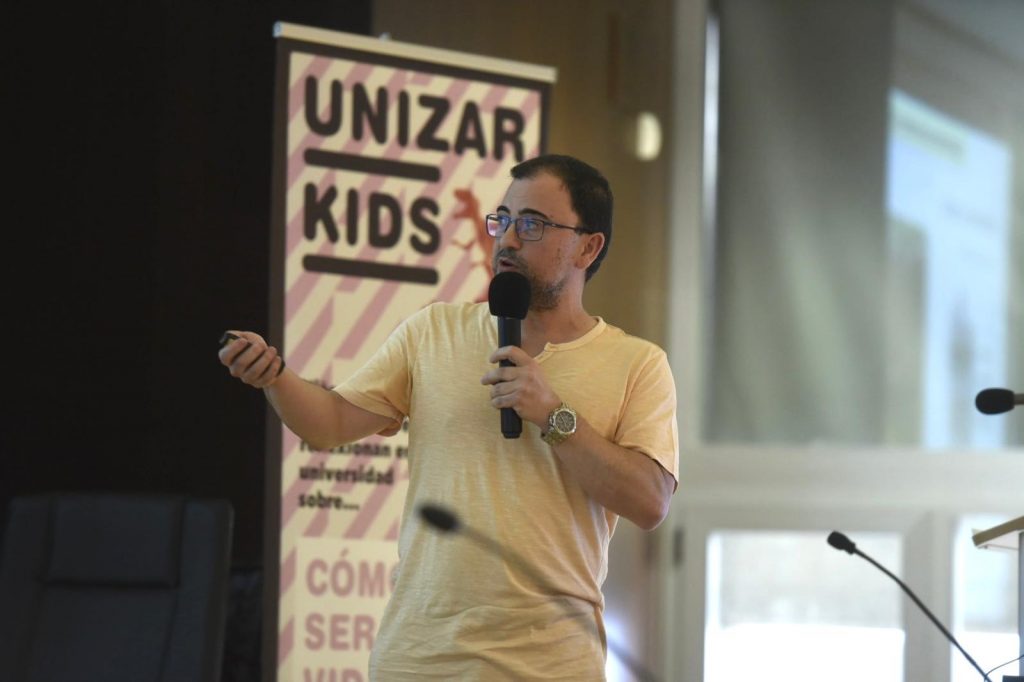(Zaragoza/Huesca, Wednesday, 18 June 2025) – Precision and conservation agriculture will be key to ensuring that planet Earth can continue to feed us in the future.
“Earth will be able to feed us in 2075, but only if we take good care of our soils and produce food sustainably. The key is not to farm more land, but to farm better—preserving soil, water and biodiversity.” This is how Manuel López and Silvia Quintana, soil science researchers at the University of Zaragoza, summed up their message during the talk “Will the planet feed us in 2075? Will there be food for everyone? A journey into the future of soils and crops”, held today at the Faculty of Business and Public Management in Huesca.
The session was part of Unizar Kids, a science outreach initiative aimed at schoolchildren. Two sessions were held today at the university’s Huesca campus, welcoming over 250 primary school students from Juan XXIII (112 students), CRA Monegros, and Santa Ana schools. The pupils were welcomed by Marta Liesa, Vice-Rector of the Huesca Campus. They also had the opportunity to explore the future of scientific discovery in the Universe, guided by physicist Susana Cebrián, a researcher at the Center for Astroparticles and High-Energy Physics (CAPA-Unizar) and the Canfranc Underground Laboratory.
In the first session, the 175 participants learned about the importance of soil, why it varies from place to place, and the current and future challenges in agriculture: “A lot of food for a lot of people—and only one planet!” They also discovered how soil health and food production are being improved today in Aragón, Spain and across Europe.
“Soils are a unique material only found on Earth and are the source of most of our food. But we have a limited area available for cultivation,” explained Manuel López Vicente, professor in the Department of Agricultural and Environmental Sciences at the Polytechnic School of Huesca, and soil researcher in the GEOFOREST group at the Institute for Environmental Sciences (IUCA-Unizar). “To ensure enough food for the global population in the future, we need to increase our soil’s productivity while protecting the environment.”

Silvia Quintana Esteras, environmental and agri-food sciences researcher specializing in soil studies in various agroecological contexts, added:
“We will have enough food for everyone if we apply good agricultural practices, avoid food waste and commit to environmentally friendly farming. The future is in our hands… and in our soils.”
In the second talk, titled “The Universe of the Future: From Atoms to Galaxies… and Beyond. Exploring the smallest particles to understand the farthest cosmos”, Susana Cebrián, professor of Atomic, Molecular and Nuclear Physics, invited the 93 attendees on a thrilling journey—diving into the tiniest particles to learn what matter is made of, and reaching out to the largest known distances in the Universe.
“In recent decades, we’ve made huge advances in these fields, but many questions remain unanswered,” Cebrián emphasized. “Today, known matter only explains about 5% of the Universe’s composition. Gaining a deeper understanding of this will be a major breakthrough.”
The physicist also referred to the Canfranc Underground Laboratory, where major experiments in astroparticle physics are being carried out. Although this knowledge may seem abstract or far removed from everyday life, she stressed that “technological advances required for this research often find useful applications that improve our daily lives.”
Inspiring curiosity about the world around us
The Unizar Kids outreach activity, titled “What will life be like in 2075?”, aims to spark early curiosity and interest in the natural world, highlight the scientific work carried out at Aragón’s public university, and bring it closer to young students—encouraging interest and scientific vocations in boys and girls.
Unizar Kids is organized by the Scientific Culture Unit at the University of Zaragoza, in collaboration with the Department of Educational Innovation at the Government of Aragón’s Ministry of Education. It forms part of the “Researchers at Schools” initiative and serves as a pre-event for the European Researchers’ Night project “G9-SCIENCE4ALL”, funded by the European Union under the Horizon Europe framework programme (Grant Agreement no. 101162477).

